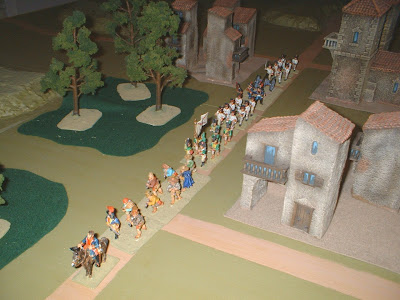
I thought that we had solved the old problem of Spanish v French on the wargame table, but unfortunately not. In fact Jan and I have already restarted the current large game twice, and are about to do it again.
The problem is how to make the Spanish armies strong enough to stand a chance again the French, but still retain some of the historical characteristics.
In our rules there are six aspects which decide how well an army performs:
1 - Command and Control
2 - Training
3 - Artillery fire
4 - Musket fire
5 - Skirmish ability
6 - Morale
There are three grades in each of the above, and we add national characteristics by adjusting them. Some armies are average in all, for example the Prussians. Some are above average in some, for example British musket fire. But I then make sure that they are below average in another, for example British artillery fire. This means that if you use tactics which make use of their higher than average ability you are a little more likely to win.
However the Spanish were average at best, and below average in many. Even in 1813 when the Spainish army was at its best, the command and control was very poor. The rest was average at best, but it can be argued that many of the others were poor also.
To overcome this I tried using larger Spanish armies against smaller French ones. When it was one French corps against two Spanish it worked ok. The French would defeat one, but that would allow the other to escape. However in a large battle that just does not work.
The current battle involves three French corps on the table against three Spanish armies also on the table. The Spanish must hold the line until a fourth Spanish army arrives. I had hoped that the numbers would work in the Spanish favour.
The problem we have encountered is that once the French rout one Spanish brigade, it leads to many more joining the rout. This is because the morale of the Spanish is also poor. So the extra numbers of Spanish brigades never get a chance to even the balance.
Jan normally commands the Spanish, but after the first game we switched sides. And I found exactly the same problem. The Spanish break and run as soon as the first brigade fails its morale.
To stop this I will have to increase the morale of the Spanish. I will therefore have to reduce the size of the armies, otherwise the French will not be able to win. So it looks like we are moving towards pretty well even fighting ability between the two.
I will aim to keep the Spanish feel by keeping the command and control very poor. 3 out of 5 Spanish generals will be poor, which means they stand a chance of missing their go each turn. 1 out of 4 French will also be poor. So there is SOME chance of the French having to miss a go.
But the main difference will be in the generals ability to issue orders. At present each corps commander rolls an average dice each turn, and adds pips depending on his class. The best possible result would be 8 pips, the worse 4 pips. He has to use 1 pip for each order, providing he is within 8" of the brigade, or to move himself. He has 6 brigades under his command. So he is unlikely to be able to do everything he wants to do.
We have made it even more difficult for the Spanish generals. They have to be in base contact to issue orders to a brigade. So they have to use 1 pip to move to a brigade and another to issue the order. This makes a Spanish army very difficult to respond to changing circumstances, and gives a very good "Spanish" feel to the game.
To see whether it all works we will have to restart our large game, yet again. And of course that means a futher delay in the Tarragona Campaign. So if nothing appears to be happening at least you know why.
I will keep you informed about whether this latest change works or not.
No comments:
Post a Comment
I have set the settings for comments to come to me before posting so that I will not miss any